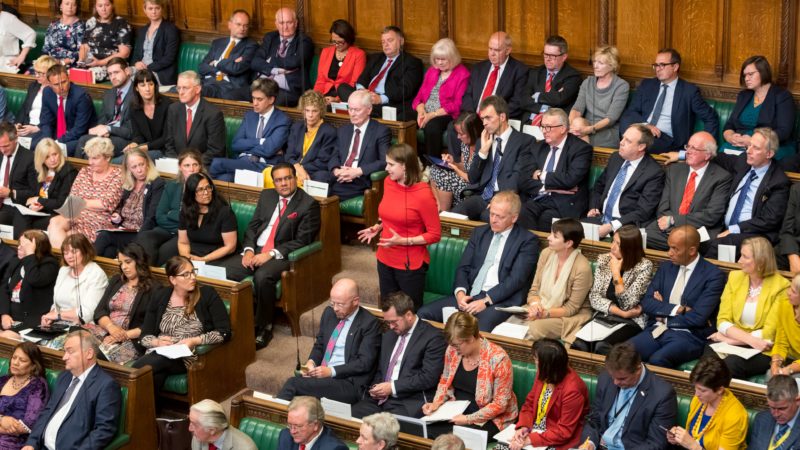
The Liberal Democrat candidate for Canterbury, Tim Walker, stood down this week and pledged his support for Labour incumbent Rosie Duffield, who is defending a majority of 187. Walker is now facing possible disciplinary action from his own party, and Jo Swinson has installed another candidate to replace him. On the following day, the Lib Dem candidate in High Peak, Guy Kiddey (now also removed as a candidate), expressed solidarity with Walker and urged voters to follow the advice of tactical voting site Remain United. Labour’s Ruth George is defending a majority of 2,322 in High Peak. The Lib Dems finished a distant third in both constituencies at the last general election.
The actions of both Walker and Kiddey during an election campaign are unprecedented, but entirely commendable. Other Lib Dem candidates across the country in Labour-Tory marginals should also stand down. The Brexit Party has stepped aside in all Tory-held seats. If the Liberal Democrats do not stand down their candidates in Labour-Tory marginals, we risk electing a hard-right Conservative government in alliance with Donald Trump and Nigel Farage. Our NHS will be at risk, and the Lib Dems would be enabling a hard Tory Brexit.
The time has come for the Lib Dems to put national interests first. Jo Swinson’s talk of being a candidate for Prime Minister and suing ITV to be included in the televised debate is not cutting through to voters. Lib Dem polling has remained static and in some cases, they have gone down. It is Labour that is on an upward trend: a recent Survation poll shows Labour only six points behind the Tories with another month to go before the election. Labour has not even unveiled its manifesto yet, and that is what helped Labour close the gap in the 2017 election. Labour has a radical and transformative programme, which will once again prove to be a vote-winner.
Like the Brexit Party, the Lib Dems are not contesting a number of seats, as part of the so-called ‘Remain alliance’ with the Greens and Plaid Cymru. It has emerged that candidates in ten of the 13 Labour-held seats targeted by the Remain Alliance have a strongly pro-Remain Labour candidate. This is surely a tactical mistake. The Lib Dems and their allies risk splitting the vote and allowing the Tory candidates in some of these seats to win. Take Penistone and Stocksbridge, for example, where the Greens did not contest and the Lib Dems came a distant fourth with 2,042 and the Labour candidate won with a majority of 1,322 in 2017. The Remain Alliance is targeting this seat, and there is a risk that this decision will allow the Tory candidate to win.
At the last general election, the Lib Dems came a distant fourth, winning only 12 seats across the country. There are some signs that they will improve on this performance at the upcoming election – but there are no major signs that they will make significant gains. They keep referring to their relative success at the European elections in May, when they finished second behind the Brexit Party. If we follow their logic, the Brexit Party would be in pole position to win this election. That is clearly not the case.
The Lib Dem position to revoke Brexit without a confirmatory referendum is not popular and will harm their chances at this election. With this policy, Swinson has effectively become the Nigel Farage of Remain. Even Caroline Lucas, whose Green Party forms part of the so-called ‘Remain alliance’, strongly criticised the Lib Dems for adopting such an overtly anti-democratic position. It is not sustainable in a democracy to cancel what 17.4 million voted for without asking them again, even if the Lib Dems could win an outright majority. The Conservatives achieved 13.6 million votes with a 42.4% vote share at the last general election – still fewer than 17.4 million.
It is more than likely that the Lib Dems will once again finish fourth behind the two main parties and the SNP. They can, however, play a critical role in this election, because they hold the balance of power in a number of Labour-Tory marginals. In Kensington, for example, Labour candidate Emma Dent Coad is defending a wafer thin majority of 20. The Lib Dem candidate, Sam Gyimah, should stand down and throw his weight behind the Labour incumbent to ensure that the Tories do not win there. Similarly, in the Cities of London and Westminster, the Tory majority is only 3,148. The Lib Dems came third with 4,270. They should withdraw their candidate, Chuka Umunna, and focus on ensuring that the Labour candidate wins. The more Labour candidates we have across the country, the chances of a confirmatory Brexit referendum increase and the risks of a hard-right Tory government decrease. It is a no-brainer. It is time for the Lib Dems to act in the national interest.




More from LabourList
‘I was wrong on the doorstep in Gorton and Denton. I, and all of us, need to listen properly’
‘Why solidarity with Ukraine still matters’
‘Ukraine is Europe’s frontier – and Labour must stay resolute in its defence’